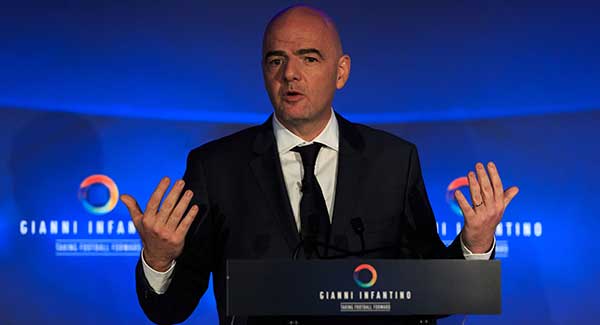FIFA president Gianni Infantino is aiming to make football a truly global sport after he saw his preferred World Cup revamp unanimously signed off on Tuesday.
From 2026, the World Cup will feature 48 teams as opposed to the 32-nation model which has been in place and untouched since France 1998.

The FIFA Council in Zurich was asked to vote on four proposals to change the existing format or stick with the current format.
It was agreed across the board to accept Infantino’s selected model, which is set to feature 16 groups of three nations with the top two sides advancing into a 32-team knock-out, increasing the number of games from 64 to 80 but remaining inside a 32-day schedule.
While financial gains for the governing body have been touted as the main reason behind an expansion, Infantino insists the game needs to reach all corners of the globe rather than remaining in its more established roots.
“We are in the 21st century and we have to shape the football World Cup of the 21st century,” he said at a press conference in Zurich.
“It isn’t any more the 20th century. It is the future, football is more than just Europe and South America, football is global.
“One event in the same period, once every four years, which will help develop football, the Council felt this was positive and it will help football development.
“The football fever you have in a country that qualifies for the World Cup is the biggest promotional tool for football you can have.
“This football promotion, in many parts of the world where today they have no chance to play (at the World Cup), was at the top of our thoughts.”
While Infantino explained the reasoning, he also revealed there are still plenty of decisions to be made before the new-look 48-team event begins in 2026.
Infantino saw his expansion plans rubber-stamped but conceded a decision has yet to be made on where the extra qualification slots will be given, although he stressed it was not vital to have signed off such an agreement as the tournament is still nine years away.
“The decision on the slots for the confederations has not been taken because it is not necessary to take the decision,” he said.
“We needed to take a decision on the format because we are preparing the documentation for the bidding process for 2026.
“Let’s not forget that the bidding process for 2026 is absolutely bullet-proof and for this it is important to know how many teams are playing, how many stadiums are needed and so forth. This is important to know.
“How many teams from different confederations, this is not necessary for the bidding process.
“That process is bullet-proof and it is important to know how many teams are playing and what the format looks like, that is important to know.
“How many teams from the different countries, this is not necessary for the process for the bidding documents.”
Infantino did suggest taking a decision on the extra slots would soon be made, adding: “It is an important topic. We have decided this will be looked at speedily to give some more certainty to the confederations.
“No guarantees have been made. The only sure thing is that everyone will have a bit more (representation) than they have today.”
Another decision which needs consideration is on separating teams who end the new group stage on the same points and goal difference as one another.
Initial suggestions were that a penalty shoot-out at the end of any drawn matches would settle results but this has also been played down by Infantino, with a decision on a remedy less forthcoming.
“With regard to penalties, this will be part of the regulations to be decided a few years before the event, it is nothing for now,” he said.
“This was an item to put out there to say there are different models for deciding if there was equality on points which will be the teams progressing to the next stage.
“We have already now rules that take care of this, goal difference and other things. If you have groups of three you have less matches so you have higher chances of teams having the same points and same goals.
“There are different ways, for example you could just say the ranking decides. That is objective and something decided before the tournament and this would also enhance the transparency.
“These are topics that will be dealt with close to the tournament, a couple of years before when the regulations are adopted.”


